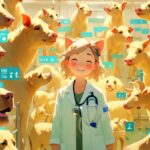Are Golden Retrievers disappearing before our eyes? Alarming evidence suggests their lifespan has plummeted in recent decades, leaving heartbroken owners searching for answers. Veterinarian Dr. Michael Lappin, drawing upon decades of experience, reveals a disturbing trend: Golden Retrievers, once known for their longevity, are dying younger.
A Shorter Lifespan: A Growing Concern
Dr. Lappin’s observations paint a stark picture of a breed facing a health crisis. ” [Most Golden Retrievers] lived up to 17 years if not more in the early days of my practice but are dying before they turn 13 now,” he shares, highlighting the dramatic shift in lifespan he’s witnessed. This decline is a serious concern for both owners and veterinarians.
The Shadow of Cancer
While the exact reasons behind this decline are complex, one factor looms large: cancer. Data from the 1980s to the 2000s reveal that Golden Retrievers have some of the highest cancer rates among dog breeds. This alarming trend has solidified cancer as a primary concern for Golden Retriever health.
Unraveling the Mystery: Potential Contributing Factors
Veterinarians and researchers are working to understand the multifaceted reasons behind this decline in lifespan. Several potential contributing factors are under investigation:
### Environmental Hazards
Could our environment be playing a role in the rise of health issues among Golden Retrievers? Research is exploring the potential impact of environmental toxins and pollutants on their overall health and lifespan.
### Shifting Lifestyles
Just like in humans, lifestyle changes can have significant impacts on health. Researchers are studying how shifts in diet, exercise routines, and exposure to certain chemicals might be affecting Golden Retrievers.
### The Role of Breeding
Could breeding practices be inadvertently contributing to health problems? Some experts suggest that the emphasis on certain physical traits may have led to an increase in genetic predispositions to diseases, including cancer.
## The Search for Answers: Ongoing Research
A groundbreaking research project, the Golden Retriever Lifetime Study, launched in 2012, aims to unravel the mysteries surrounding the breed’s declining lifespan. This ambitious study examines a wide range of factors, including genetics, diet, environment, and lifestyle, with the hope of identifying causes and developing solutions to improve the health and longevity of Golden Retrievers.
## What Can Owners Do?
While research continues, there are proactive steps owners can take to help protect their Golden Retrievers:
### Prioritize a Healthy Lifestyle:
* **Diet:** Feed a high-quality diet, low in fat and high in fiber.
* **Exercise:** Provide regular exercise to maintain a healthy weight.
* **Weight Management:** Obesity can increase the risk of many health problems, including cancer.
### Minimize Exposure to Toxins:
* **Chemicals:** Limit exposure to pesticides, herbicides, and harsh cleaning products, opting for pet-safe alternatives.
* **Secondhand Smoke:** Avoid exposing your dog to secondhand smoke.
### Regular Veterinary Care is Crucial:
* **Check-ups:** Schedule regular veterinary checkups for early detection and disease prevention.
* **Vaccinations:** Stay up-to-date on vaccinations.
## Golden Retriever Lifespan: Outperforming the Competition
While the declining lifespan of Golden Retrievers is a pressing concern, it’s essential to contextualize this trend. Despite these challenges, Golden Retrievers, on average, still live longer than many other dog breeds. This resilience speaks to their inherent hardiness and the dedication of owners and veterinarians in providing care.
## A Collective Effort for a Brighter Future
The declining lifespan of Golden Retrievers is a complex issue with no easy solutions. However, through ongoing research, responsible breeding practices, and proactive care from owners, there is hope for a brighter future, one where these beloved companions can enjoy longer, healthier lives alongside their human families.
- Unveiling Bernhard Caesar Einstein’s Scientific Achievements: A Legacy in Engineering - July 15, 2025
- Uncover who is Jerry McSorley: CEO, Family Man, Business Success Story - July 15, 2025
- Discover Bernhard Caesar Einstein’s Scientific Contributions: Unveiling a Legacy Beyond Einstein - July 15, 2025















